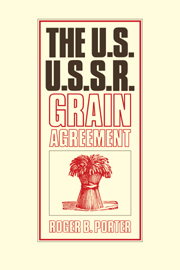Book contents
- Frontmatter
- Contents
- Foreword
- Preface
- List of acronyms used in the text
- 1 Introduction
- 2 U.S.–Soviet grain trade before 1974
- 3 The 1974 experience
- 4 The Russians return
- 5 First steps
- 6 A strategy emerges
- 7 Agreement to seek a long-term arrangement
- 8 Refining the details
- 9 Ebbing leverage: the waiting game
- 10 Evaluations
- 11 Reflections
- Epilogue
- Appendices
- Bibliography
- Index
9 - Ebbing leverage: the waiting game
Published online by Cambridge University Press: 05 November 2011
- Frontmatter
- Contents
- Foreword
- Preface
- List of acronyms used in the text
- 1 Introduction
- 2 U.S.–Soviet grain trade before 1974
- 3 The 1974 experience
- 4 The Russians return
- 5 First steps
- 6 A strategy emerges
- 7 Agreement to seek a long-term arrangement
- 8 Refining the details
- 9 Ebbing leverage: the waiting game
- 10 Evaluations
- 11 Reflections
- Epilogue
- Appendices
- Bibliography
- Index
Summary
There was no question that the furor in the farm community subtly, yet decisively, altered U.S. negotiating strength. Time was now on the Russian side. Farmers, already skeptical of the claim that the suspension of grain sales to the Soviet Union represented a unique act to deal with a unique case, saw their skepticism justified when the suspension was extended to Poland. The emotionalism frequently displayed by American consumers in opposition to Russian grain sales now filled the agricultural community in support of them.
As the fourth week in September drew to a close, it became apparent that the Soviets felt the leverage once held by the United States was ebbing. Each passing day made it more difficult for the administration to deal with the farm community. Clearly, extending the suspension past the end of October would entail heavy political costs for an administration facing an election in twelve months. Moreover, the Soviets had combined retrenching at home with the purchase from non-U.S. sources of small lots of feed grains and wheat totaling almost 3 million tons, increasing their total purchases for the year to more than 20 million tons. Inadequate Soviet port and transportation capacity prevented the Russians from importing much more than 3 million tons of grain a month. Having already bought more than 20 million tons, it would be months before they could take delivery on additional purchases from the United States.
- Type
- Chapter
- Information
- The U.S.-U.S.S.R. Grain Agreement , pp. 81 - 90Publisher: Cambridge University PressPrint publication year: 1984

